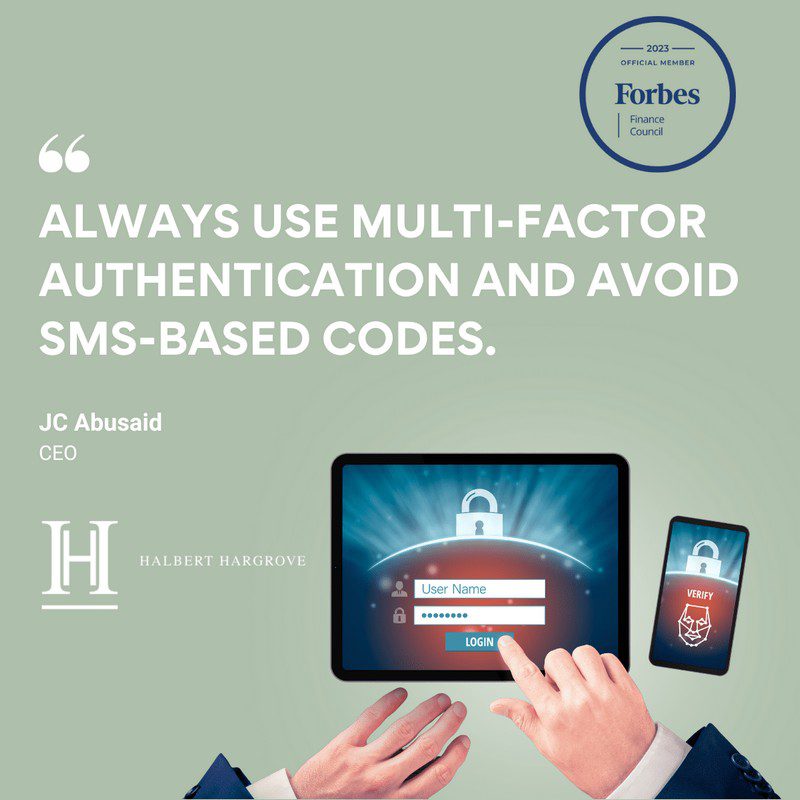By Forbes Finance Council, Forbes featuring By JC Abusaid, CEO/President
As technology and the potential to exploit it continue to evolve, the importance of safeguarding personal data and intellectual property (IP) has never been more critical. Since most consumers now have sensitive information and IP stored online, individuals must take proactive measures to protect their digital assets.
Below, 12 Forbes Finance Council members offer practical insights on how consumers can fortify their defenses against hacking attempts, data breaches and IP theft. Follow their recommendations to maintain better control over your data and IP in an increasingly connected world.
1. Use Basic Security Knowledge
Protecting yourself from being hacked doesn’t have to be complicated. You should keep your software and computer up to date with the latest security patches, use strong passwords, don’t open suspicious emails and avoid websites you don’t trust. Having a general awareness of vulnerabilities and entry points for hackers will help you mitigate a lot of risk. – Vlad Rusz, Centaur Digital Corp
2. Review Finances Weekly
Weekly management of your financial accounts and credit is key to protecting your money, data, credit and identity. Identity management software will also help to ensure protection. If consumers will schedule a non-negotiable time to review these items for a few minutes every week then they will increase the odds of protecting their data substantially! – Leo Kanell, 7 Figures Funding
3. Be Cautious
Exercise caution with your data, particularly with payment requests or urgencies. Always opt-in for two-factor authentication and consider adding biometric verification for better security. Be wary of urgent payment emails—if in doubt, verify them with the sender. Be cautious when clicking on suspicious links or opening unknown documents. – Nick Chandi, Forwardly
4. Upgrade To The Latest Security Tools
Protecting against digital threats to data and IP requires taking advantage of the latest security tools. Right now, that means enabling two-factor authentication, using strong, unique passwords and regularly updating software. But it also includes staying on top of trends and new technologies that improve security. Limit posting personal information online and invest in reputable cybersecurity. – Jared Weitz, United Capital Source Inc.
5. Understand The Value Of Your Digital Assets
Consumers must recognize the true value of their digital assets. Safeguarding against cyber threats requires not just technological defenses, but a proactive commitment to understanding, valuing and strategically managing your data and IP. In an era where information is currency, empowerment through awareness is the key to fortifying the fortress of your digital world. – Joseph K. Hopkins, Fallingst Technologies LLC
6. Be Proactive About Protection
With cyber threats soaring, individuals must proactively stay ahead of hackers to ensure data protection. First, a robust firewall secures computers by creating a barricade between your data and the outside universe. Second, antivirus software shields your system by thwarting viruses that can cripple your data. Finally, use complex passwords to limit hacking potential and keep you best protected. – Greg Bassuk, AXS Investments
7. Take Advantage Of Security Updates And Two-Factor Authentication
Amid a growing recent spike in data breaches, consumers must adopt all new software updates and industry best practices like two-factor authentication (2FA). These sophisticated hackers can easily outmaneuver consumers, so by staying apprised of these best practices and regularly updating software across all devices can take time, consumers can better protect their confidential data. – Anthony Georgiades, Innovating Capital
8. Get IP Infringement And IP Enforcement Insurance Coverage
An often-overlooked aspect of IP protection is IP Infringement and IP Enforcement insurance coverage. These insurance policies add additional layers of protection beyond traditional methods of copyrights, patents, trademarks and so on. These coverages work to offset the costs of enforcing your IP protections and of defending against claims that you’ve infringed upon another’s IP. – Justin Goodbread, WealthSource Partners, LLC
9. Train Your Staff
When you’re on the job, train staff to avoid scams. Malware in emails steals personal data. URLs can infect workers without their knowledge. The best method to combat phishing is to train staff to utilize a password management system to check links before opening them. These prevent accidental hacking. Administrators who access sensitive data or systems on your network, online or offline, should use strong passwords. – Neil Anders, Trusted Rate, Inc.
10. Use Multi-Factor Authentication Over SMS-Based Codes
Always use multi-factor authentication and avoid SMS-based codes, if possible, for stronger methods. One-time token-based authenticators are now considered much more secure because they are tied to a specific device. If possible, avoid SMS-based codes as they are subject to SIM swapping or hijacking. – John Abusaid, Halbert Hargrove


